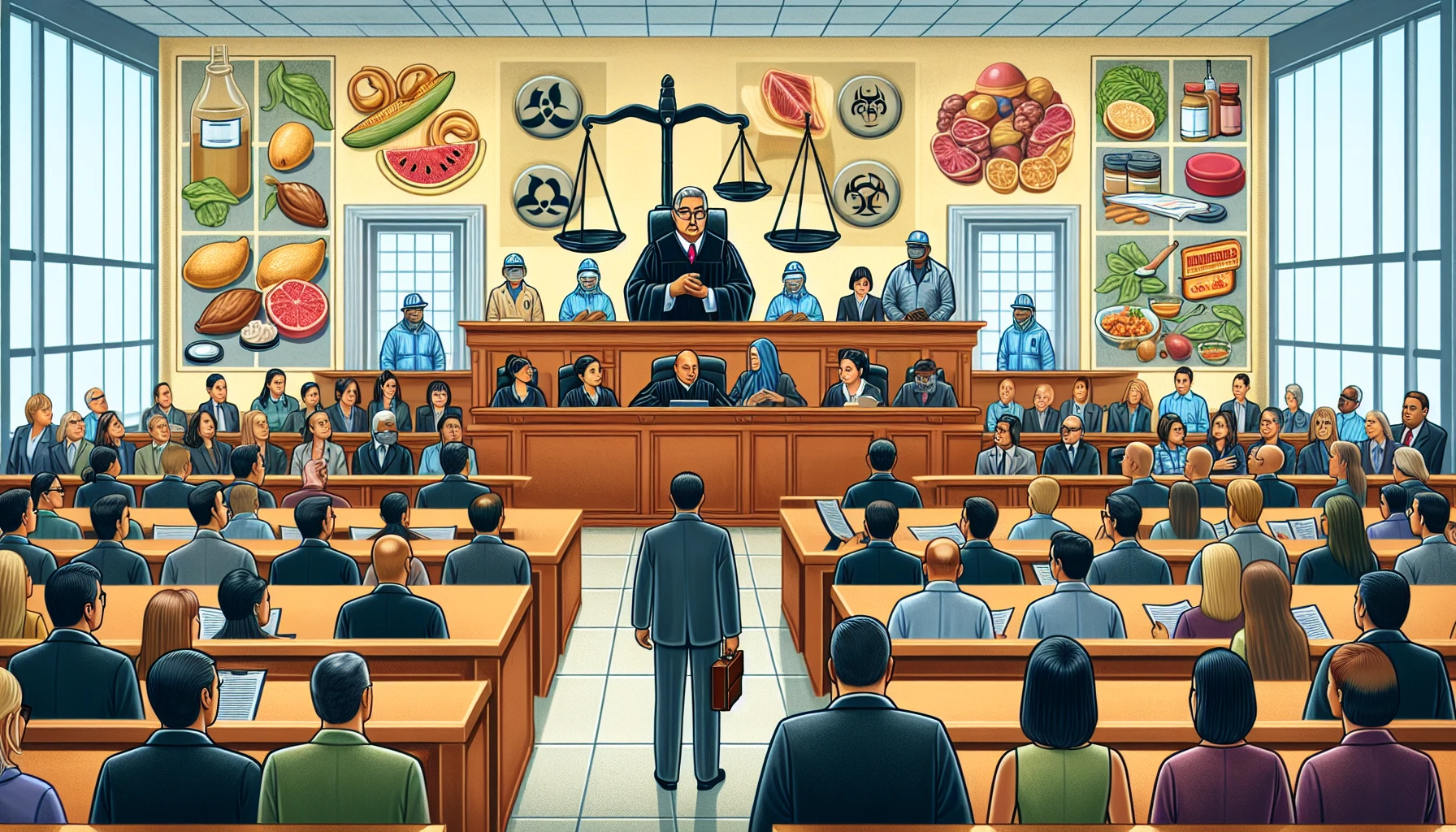Table of Contents
- Understanding Norovirus and Its Legal Implications
- Establishing Liability in Norovirus Lawsuits
- Steps to Take After Suffering from a Norovirus Infection
- Compensation Claims in Norovirus Lawsuits
- Client Experiences with Norovirus Lawsuits
- Protecting Public Health Through Litigation
- Norovirus Lawsuit Summary
Imagine enjoying a meal at your favorite restaurant, only to find yourself suffering from severe stomach pain and other unpleasant symptoms a few hours later. Foodborne illnesses, such as norovirus, can have a significant impact on your health and well-being. We’ll explore the legal implications of norovirus outbreaks, the steps to take after contracting the illness, and how a norovirus lawsuit can help protect public health by holding companies accountable for food safety standards.
Key Takeaways
- Norovirus is a highly contagious virus with legal implications related to food safety regulations and companies’ obligations to protect consumers.
- Companies may be held liable for negligence in food handling, such as improper washing and cleaning, resulting in norovirus outbreaks.
- Victims of norovirus can pursue compensation through out-of-court settlements or trial with assistance from specialized firms.
Understanding Norovirus and Its Legal Implications

Norovirus, commonly known as stomach flu, is a highly contagious virus that causes acute gastroenteritis. It is often associated with foodborne illnesses, as the virus can contaminate ready-to-eat products prepared by food workers or fresh produce.
When norovirus outbreaks occur, they bring about legal implications, involving food safety regulations and the obligations of companies to uphold their consumers’ well-being.
The Role of Food Safety Laws in Norovirus Lawsuit Cases
Assistant Attorney General Jody Hunt stresses the necessity for restaurants and those in the food services industry to comply with food safety policies to avert norovirus outbreaks. These policies include:
- Adopting norovirus-related food service stipulations of the FDA Food Code
- Complying with local food regulations
- Implementing measures to prevent contamination of ready-to-eat foods.
Various entities, such as the FDA, the United States Department of Agriculture’s Food Safety and Inspection Service (FSIS), the Food Safety Council, and local health department, are responsible for the enforcement of food safety regulations. These agencies have the authority to inspect food establishments, conduct investigations, and enforce compliance with food safety standards.
Companies, like Chipotle Mexican Grill, a popular chipotle restaurant, which contravene these laws, might face severe penalties, including fines.
Company’s Responsibility Under Food Safety Protocols
Companies are responsible for maintaining company food safety protocols to prevent norovirus outbreaks. Standard protocols include regular hand hygiene practices, ensuring sick employees stay at home, minimizing contact with food without gloves, and disinfecting high-touch surfaces. The FDA has established guidelines for food establishments to follow, such as proper hand hygiene, excluding ill or infected food employees, and developing written procedures for cleaning up vomit and diarrhea.
Failure to adhere to food safety protocols can lead to severe consequences, including criminal fines. For example, Chipotle Mexican Grill was issued a $25 million fine for its involvement in foodborne illness outbreaks, including those related to norovirus.
Maintaining compliance with food safety regulations and performing the company’s food safety audits can assist companies in evading legal issues, preserving their reputation, and safeguarding public health.
Establishing Liability in Norovirus Lawsuits

In norovirus food poisoning cases, liability can be determined by pinpointing negligence in food handling, like serving undercooked or raw food, insufficient handwashing, and inadequate cleaning of food preparation surfaces. When food companies fail to meet safety standards, they may be held liable for norovirus outbreaks and face potential legal action.
Identifying Negligence in Food Handling
Negligence in food handling can lead to norovirus outbreaks and potential lawsuits. To demonstrate negligence, you may need to collect the following evidence:
- Documentation of the contaminated food
- Test results confirming the presence of norovirus
- Medical records
- Witness statements
- Inspection reports
Companies that are found to be negligent in food handling may face legal repercussions, such as lawsuits and financial penalties. For instance, Chipotle safety officials had to address issues with food handling in the past to prevent further outbreaks.
Ensuring proper food handling practices and implementing a food safety program can help hold food companies accountable, avoid liability, and protect consumers from foodborne illnesses.
When Food Companies Fall Short
Food companies may be held liable for norovirus outbreaks if they fail to meet safety standards. These companies can face legal consequences, such as lawsuits and financial penalties, for their negligence in food handling. One example is Chipotle Mexican Grill, which entered into an agreement to pay a $25 million criminal fine for its involvement in foodborne illness outbreaks, including norovirus outbreaks.
To address their liability for norovirus outbreaks, food companies have taken the following actions:
- Instituted more stringent food safety practices
- Enhanced communication with the public
- Faced legal repercussions such as fines and deferred prosecution agreements
These actions help companies navigate foodborne illness litigation and protect their reputation.
Steps to Take After Suffering from a Norovirus Infection
Following a norovirus infection, one should seek medical care and contemplate reaching out to seasoned attorneys to discuss possible legal action. Legal representation can help you navigate the legal process, collect evidence, and negotiate settlements or achieve favorable verdicts in court.
Contacting Norovirus Lawsuit Attorneys

Norovirus attorneys, specializing in plaintiff foodborne illness litigation, can provide the following services for victims of foodborne illness outbreaks:
- Case evaluation
- Evidence collection
- Expert witness coordination
- Negotiation of settlements or verdicts in court
When selecting a norovirus attorney, consider their experience, track record, and understanding of food safety laws. Experienced attorneys can help you build a strong case, ensuring the best possible outcome in your pursuit of compensation for any damages suffered due to a norovirus outbreak.
Compensation Claims in Norovirus Lawsuits
In norovirus outbreak litigations, compensation claims can lead to financial restitution for victims. These claims may be resolved through out-of-court settlements or trial, with varying levels of risk and reward.
Out-of-Court Settlements vs. Trial

Both out-of-court settlements and trials provide potential compensation for victims of norovirus. Settlements involve negotiated agreements between parties, which can result in a quicker resolution and lower legal costs. However, settlement amounts may be lower than what could be awarded in a trial.
Taking a case to trial can result in a higher compensation amount if the plaintiff is successful. However, trials can be lengthy, expensive, and unpredictable, with no guarantee of a favorable outcome. When selecting between settling or proceeding to trial, one must balance potential risks against rewards and seek advice from seasoned norovirus attorneys to identify the most suitable course of action.
Client Experiences with Norovirus Lawsuits
Clients who have pursued norovirus litigation often emphasize the importance of experienced legal representation. Skilled norovirus attorneys can help clients with:
- Navigating the legal process
- Collecting evidence
- Negotiating settlements
- Achieving favorable verdicts in court.
A successful outcome in norovirus litigation can:
- Provide compensation for the client
- Hold companies accountable for food safety standards
- Lead to improved food handling practices
- Result in better public health outcomes
This highlights the significance of legal action in such cases.
Protecting Public Health Through Litigation

In norovirus cases, litigation serves a significant role in safeguarding public health by holding companies to account for maintaining food safety standards. When companies face legal consequences for their negligence, they are more likely to prioritize food safety measures and adhere to regulations, thus preventing future outbreaks.
One notable example of a food safety case leading to improved standards is the litigation involving Chipotle Mexican Grill. After a norovirus outbreak in Boston, Chipotle was fined $25 million and implemented a comprehensive food safety compliance program. This case emphasizes the importance of proper food handling and hygiene practices in preventing norovirus outbreaks and their consequences.
Norovirus Lawsuit Summary
In conclusion, understanding norovirus and its legal implications is crucial for those affected by foodborne illness outbreaks. By holding companies accountable for food safety standards through litigation, public health can be protected, and victims can receive the compensation they deserve. If you or a loved one has suffered from a norovirus infection, don’t hesitate to seek legal advice from experienced attorneys to discuss your options and potential compensation claims.
Frequently Asked Questions
Can you sue over norovirus?
A norovirus attorney can investigate if your illness is linked to someone’s negligent actions and recommend filing a lawsuit.
Who is the most common victim of norovirus?
Young children are the most common victims of norovirus, accounting for 200 million cases annually and resulting in 50,000 deaths each year, especially in developing countries.
What is the survival rate for norovirus?
Norovirus hospitalization rates range from 1-19 per 10,000 people and mortality rates from 0.4-3.2 per 100,000 people, making its survival rate relatively high.
What are the symptoms of norovirus?
Norovirus symptoms include stomach pain, nausea, diarrhea, and vomiting, which can cause severe dehydration in some cases.
How do food safety laws help prevent norovirus outbreaks?
Food safety laws ensure proper food handling, hygiene and sanitation standards to help prevent norovirus outbreaks.

